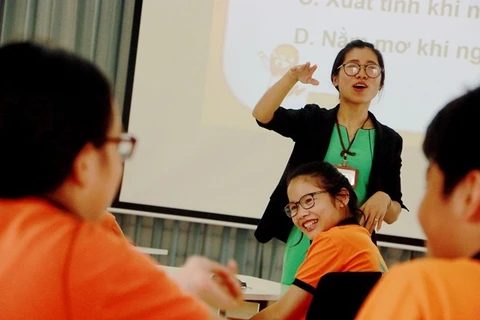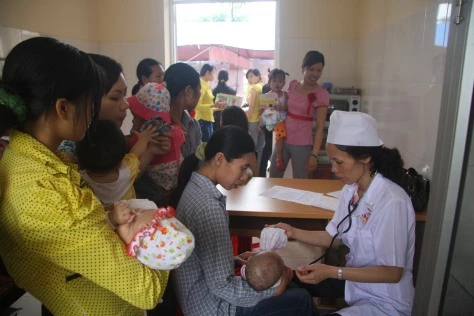 Health staff give reproductive consultancy to a young woman at Hoan Kiem District’s Health Centre. (Photo: VNA)
Health staff give reproductive consultancy to a young woman at Hoan Kiem District’s Health Centre. (Photo: VNA) HCM City (VNA) - Many young Vietnamese couples seem to deliberately avoid pre-marital health screenings for fear that these will find health problems and ruin their budding marriages, a survey found.
Dr Bui Duy Luat from the Department of Kidney Surgery and Transplant under People Hospital 115, said he and his colleagues were quite surprised to learn that of 400 young couples surveyed, only 2 percent were willing to undergo premarital health tests for genetic and infectious diseases.
The survey is not a comprehensive statistical research given its small scale and the fact that it was conducted during a talk on reproductive health held at the hospital, but the results are quite alarming, he said.
According to the survey, 85 percent of the participants said they had never even heard of premarital health examinations, while 10 percent said they had but don’t know what these entail.
Luat attributed the lack of awareness of such testing to the fact that authorities have not explained their importance to young people. Some were concerned about the price of such tests, he added.
Another reason could be embarrassment. According to a report released three years ago by the Maternal and Child Health Department, a third of Vietnamese below 18 thought using a condom was "inappropriate" behaviour, and 16 percent said condoms were for prostitutes and adulterers only. That attitude might also pertain to the issue of premarital health examinations.
But Luat also revealed that during the talk, 70 percent said youngsters are worried that the diseases discovered would ruin their marriage plans. A partner who brings up the issue of check-ups will likely be misunderstood as lacking trust in the other, undermining the relationship.
According to Dr Vuong Thi Ngoc Lan from the Department of Gynecology at HCM City Medical University, couples who are fully in the know about each other’s health before tying the knot will be more prepared, psychologically and physically, for long-term plans.
For example, couples with detected reproductive health issues will be able to take measures to increase their chances of pregnancy.
Furthermore, even if one or both partners are found to have certain conditions, these can be remedied. For example, if semen analysis shows some abnormalities, it does not necessarily mean he is completely infertile. “Most conditions are amenable to early diagnosis and treatment,” Lan said.
Luat added that if health problems were detected, experts would be readily available at medical centres to provide counseling and treatment.
According to Luat, husbands and wives-to-be registering for premarital checkups will be provided with diagnoses, treatments and preventive measures for a range of conditions.
Conditions related to potential infertility are part of the testing for bride and groom, and disease common to both sexes are also tested, such as sexually transmitted diseases (STDs), tuberculosis, hepatitis type B and type C. Risks of rubella, tetanus, chickenpox, blood disease and birth defects, among others, for the babies born to these couples will also be assessed and appropriate solutions are put forward.
Ho Ky Thu Nguyet of Tu Du Hospital said the ideal time to get checkups is three to six months prior to marriage – “enough time for the treatment of average conditions.”-VNA
VNA























